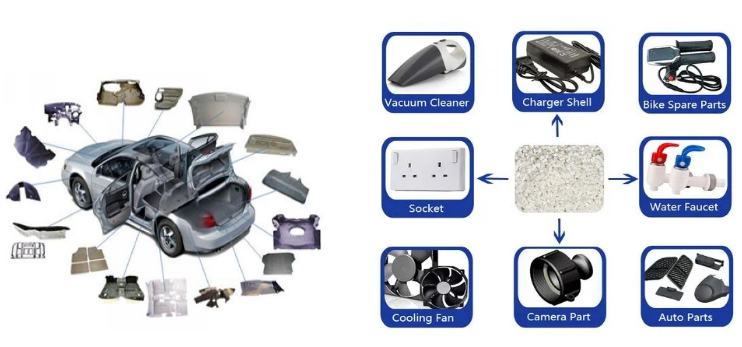FEATURE
ABS is a copolymer of acrylonitrile, butadiene and styrene, which is a high volume engineering thermoplastic, favoured for its strength, scratch resistance, chemical resistance, high impact and attractive finish. ABS is produced from three monomers, including acrylonitrile (provide thermal and chemical resistance), butadiene (provide rubber-like ductility and impact resistance) and styrene (provide stiffness, the ability to be easily processed and reduce overall cost).
ABS resin can be made into a wide range of components via injection moulding and extrusion..
APPLICATION
Widely used in the production of automotive parts, consumer electronics and household appliances.

TECHNICAL DATA
Typical Property | Unit | Test Method | TIK-715 | TIK-747 | TIK-756 | TIK-757 | TIK-758 |
MFR 200℃,5kg | g/10min | ASTM D1238 | 2.0~8.0 | 3.0~9.0 | 2.0~8.0 | 0.5~4.0 | 1.0~5.0 |
Vicat Softening Point | ℃ | ASTM D1525 | 95±5 | 105±5 | 105±5 | 105±5 | 105±5 |
Heat Distortion temperature | ℃ | ASTM D648 | 80~95 | 82~97 | 84~99 | 83~99 | 83~99 |
Tensile Strength | MPa | ASTM D638 | ≥32.0 | ≥32.0 | ≥28.0 | ≥32.0 | ≥30.0 |
Break Elongation | % | ASTM D638 | 20~40 | 20~40 | 20~40 | 10~30 | 30~50 |
Impact Strength,Izod | J/m | ASTM D256 | 230±30 | 250±30 | 180±30 | 180±30 | 150±30 |
Hardness | R | ASTM D785 | 110±10 | 115±10 | 115±10 | 115±10 | 110±10 |